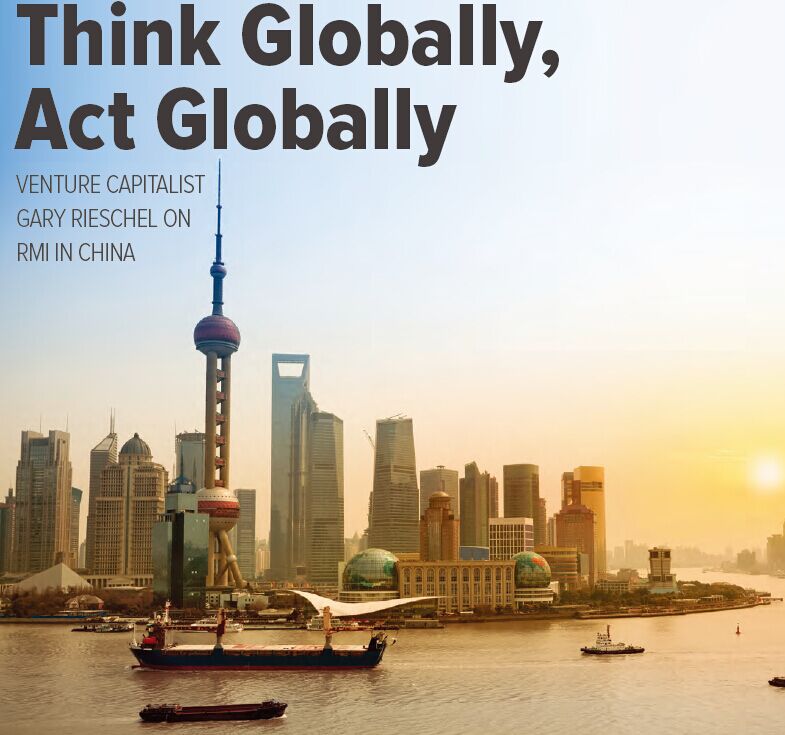
Gary Rieschel has built a phenomenally successful set ofbusinesses in a career that straddles the tech revolution in the United Statesand Asia. Along the way, he refined a global perspective on what makes true transformationhappen. A resident of Shanghai for the past ten years, he and his family arecommitted to changing China’s environmental tragedy into a success story thewhole world can learn from. That’s why Rieschel has been such a strong supporterof Reinventing Fire: China. “Youhave to align yourself with people that have the discipline, the dedication,and the stamina, frankly, for what it takes to actually get things done,” saysRieschel. “How many have done what Amory and Rocky Mountain Institute have doneand been hammering away at this for 30 years? You look for people whoappreciate that this is not an instant fix.”

Reinventing Fire: China takes that long view. Its rigorousanalysis and companion policy recommendations identify the maximum share energyefficiency and clean energy could provide to support China’s forecasted economicgrowth through 2050. RF: China is a from-the-ground-up Chinese version ofReinventing Fire (RMI’s analysis for the U.S. published in 2011).
Rieschel knows a thing or two about economic growth. QimingVenture Partners—a $1.6-billion fund he founded and manages—focuses onearly-stage investments in China, where it’s one of the top venture-capitalfirms. But it’s only the latest in a long line of start-ups in Silicon Valley,Japan, and China. He was an executive in the early years of Intel and Cisco,and helped to bring the IT revolution to Asia by building joint venturesbetween American tech giants and Asian partners. He quickly moved into venturecapital as a leader of firms like Softbank Venture Capital and IgnitionPartners, before moving with his family to China in 2006.
CHINA'S ENVIRONMENTAL CHALLENGES
Rieschel also has a deep-seated passion for the environment.“It stems from reading books and getting involved in activities in Oregon whenI was a kid,” he says. “Rachel Carson was one of my heroes growing up.” Todayhe and his wife, Yucca Wong Rieschel, are active supporters of environmental andeducational causes. So they feel acutely challenged by the environmental degradationin China. Some in China talk of the ‘three T problem’—$1 trillion each to cleanup the water, the land, and the air. It is shorthand for the scale of theproblem, says Rieschel. “The key is, there’s no such thing as a small problemin China. And there really isn’t a good example of how to do it at the scale ofthe problems that China has.” Making headway thus requires huge ambition, boldaction, and relentless patience—all guiding principles of RMI and its ReinventingFire synthesis.
Rieschel thought this pragmatic approach could really helpChina, and the world. Jack Wadswor th, an old friend and Morgan Stanley veteranwith decades of experience in East Asia, invited Rieschel to a summit atAmory’s home three years ago. “Reinventing Fire had just come out,and the thing that I liked about RMI’s approach is the Chinese are generallytechnocrats; they look for solutions,” says Rieschel.
“Whatit does is outline a very strong economic rationale for choices that could betranslated into decisive action in China.” Ultimately, Reinventing Fire: Chinawould not be happening without the support of Rieschel, Wadsworth, and otherslike them. Rieschel has generously supported the project from its inception,both financially and strategically. He has been indispensable advising,guiding, and making introductions for the RMI team in China. For Rieschel itwas a natural progression—“being in China, realizing exactly how awful the environmentalsituation is here, looking at RMI as a really strong potential solution base forthat, and then helping fund and promote RMI’s entry to China.”
SOLUTIONS FOR THE WORLD
The project has since evolved into a major collaborationbetween the Energy Research Institute of China’s National Development andReform Commission, the NDRCsponsored Energy Foundation China, the China EnergyGroup at Lawrence Berkeley National Laboratory, and RMI. The hope and intent isfor Reinventing Fire: China’s analysis and policy recommendations (to bepublished later this summer) to help inform China’s upcoming 13th Five-Year Plan—andthe future of global climate. “Some of what happens in China may be perfectlyappropriate for what’s going to be required in Nigeria and India,” saysRieschel. “You’regoing to have a larger palette of solutions the world can choose from. If we canfind examples over the next three to five years of China’s successfullyimplementing Reinventing Fire concepts, then you can go to the rest of theworld and say, ‘People in the United States have done this, people in China didsomething a little different. What solution works best for you?’”